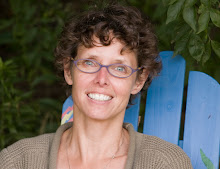Here like the "here" in this sentence
Great poem on
Writer's Almanac this morning:
Poem: "After Reading T'ao Ch'ing, I wander Untethered Through the Short Grass" by Charles Wright, from
Appalachia. © Farrar, Straus and Giroux, 1998.
After Reading T'ao Ch'ing, I wander Untethered Through the Short Grass
Dry spring, no rain for five weeks.
Already the lush green begins to bow its head and sink to its
knees.
Already the plucked stalks and thyroid weeds like insects
Fly up and trouble my line of sight.
I stand inside the word here
As that word stands in its sentence,
Unshadowy, half at ease.
Religion's been in a ruin for over a thousand years.
Why shouldn't the sky be tatters,
lost notes to forgotten songs?
I inhabit who I am, as T'ao Ch'ing says, and walk about
Under the mindless clouds.
When it ends, it ends. What else?
One morning I'll leave home and never find my way back—
My story and I will disappear together, just like this.
Imaginary Friends
I was checking in on the Dulwiche Centre site this morning to see what new things they are doing in the area of narrative, and I found this delightful article. I love the idea of creating the relationships with loving energy as a precursor to people coming to fill those roles. Enjoy.
Imaginary Friends: Who are they? Who needs them?, by Emily Betterton & David Epston
Ancestors and the Book of Learning
I read a quote from Chogyam Trungpa this morning and it got me thinking. He suggested we look at the way our ancestors were able (or not) to deal with issues like ego and neurosis (which is what he calls pain). There seems always to be a tension between the ages--we don't want to do what our parents, grandparents, great-grandparents did (we live in the "modern" age, after all), but if we simply reject them out of hand we lose access to what they've already mastered and the very real benefit their struggle offers us. If we consider how our own ancestors met and faced with the challenges we struggle with today, we might find surprising things. At the least, we will be able to see clearly some of the unspoken expectations and formative beliefs that have been present in our lives without our seeing them. I may find clues to why I believe/act/think/experience life as I do if I look at what my ancestors believed/did/thought/experienced before me.
So how did your ancestors approach/honor/deal with the following things?
health
wealth
responsibility
relationships
work
faith
self-acceptance
sense of purpose
With just a quick look, I can span a few generations and see some people who did well in some areas and not so well in others; I see evidence of someone who mastered the wealth part and was seemingly clueless about relationships; I see faith that went underground; I see lost purpose (and found purpose, in another generation); I see the mushrooming of almost fanatical faith and then the distancing reaction in the next generation. And that's just a quick glance--I know there's much much more.
A long time ago I began playing with the idea that in each generation children, as part of their task in creating their own lives and moving forward, seek to answer an unresolved question carried by one or both parents. As an adult, the child shapes his or her own answer to that question, on a deep, unspoken level, completing something for the parent. Then that child, as an adult, will deeply ask his or her own incomplete questions, and the next generation will take one of those questions and, perhaps completely unknowingly, find the answer, resolving the question for the parent, and moving forward into following his or her own questions (which won't be answered fully until the next generation rolls around).
It reminds me of Moses leading the children of Israel through the desert but not being allowed to enter to promised land himself. It seems to me fitting that we need all generations--preceding us and following us--in order for our lives to truly bloom fully in all their magnificence.

 RSS feed
RSS feed

